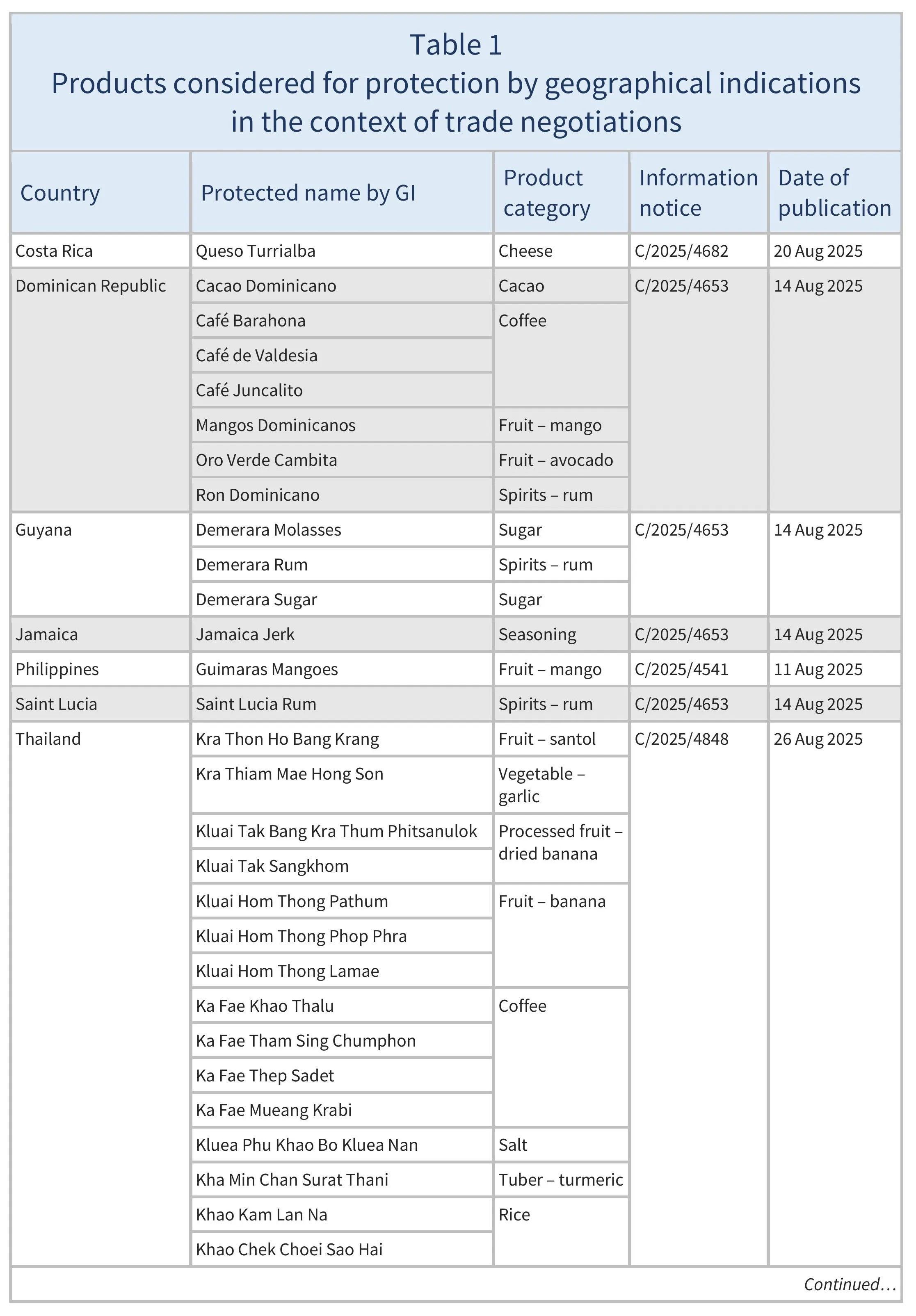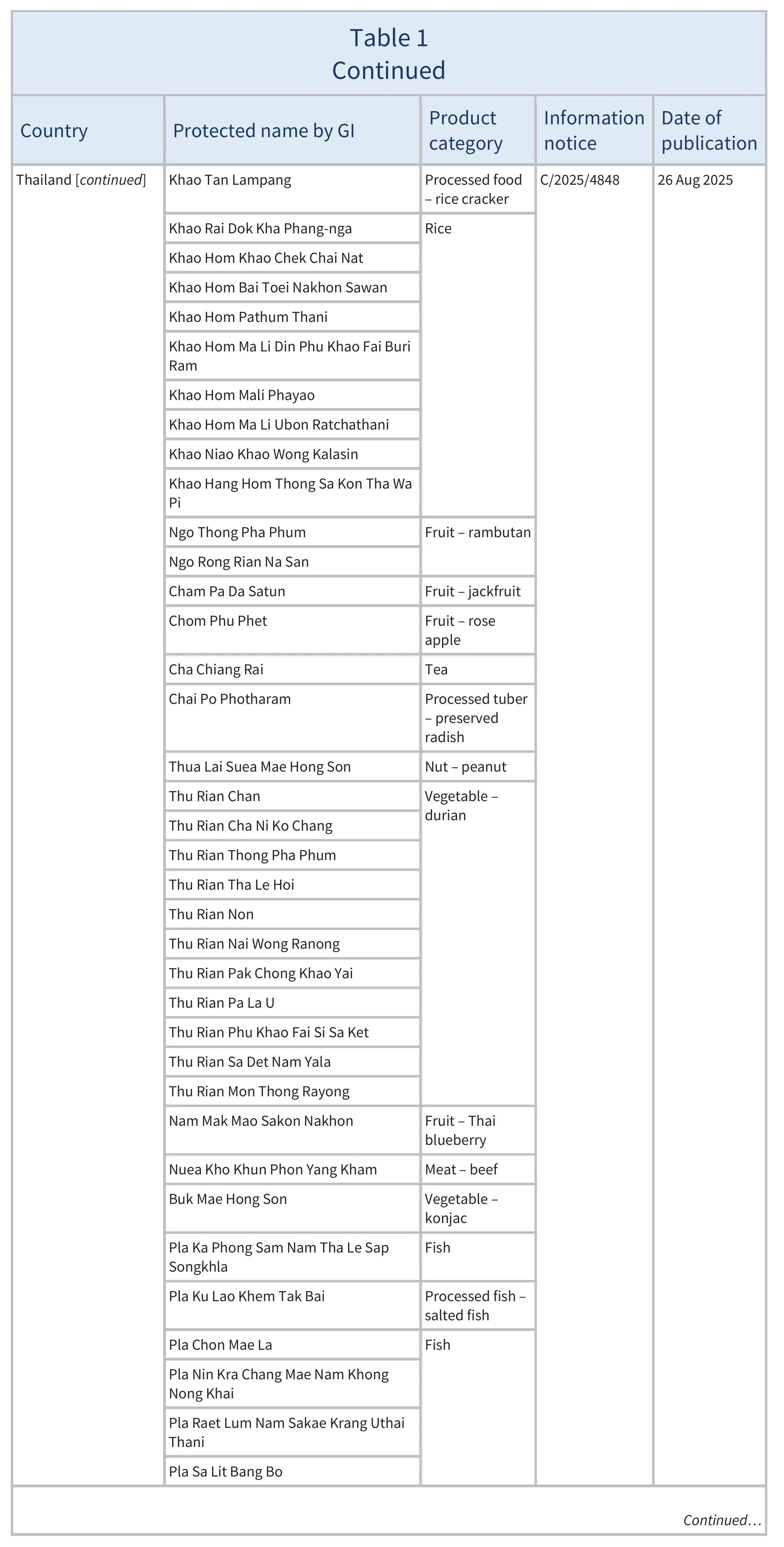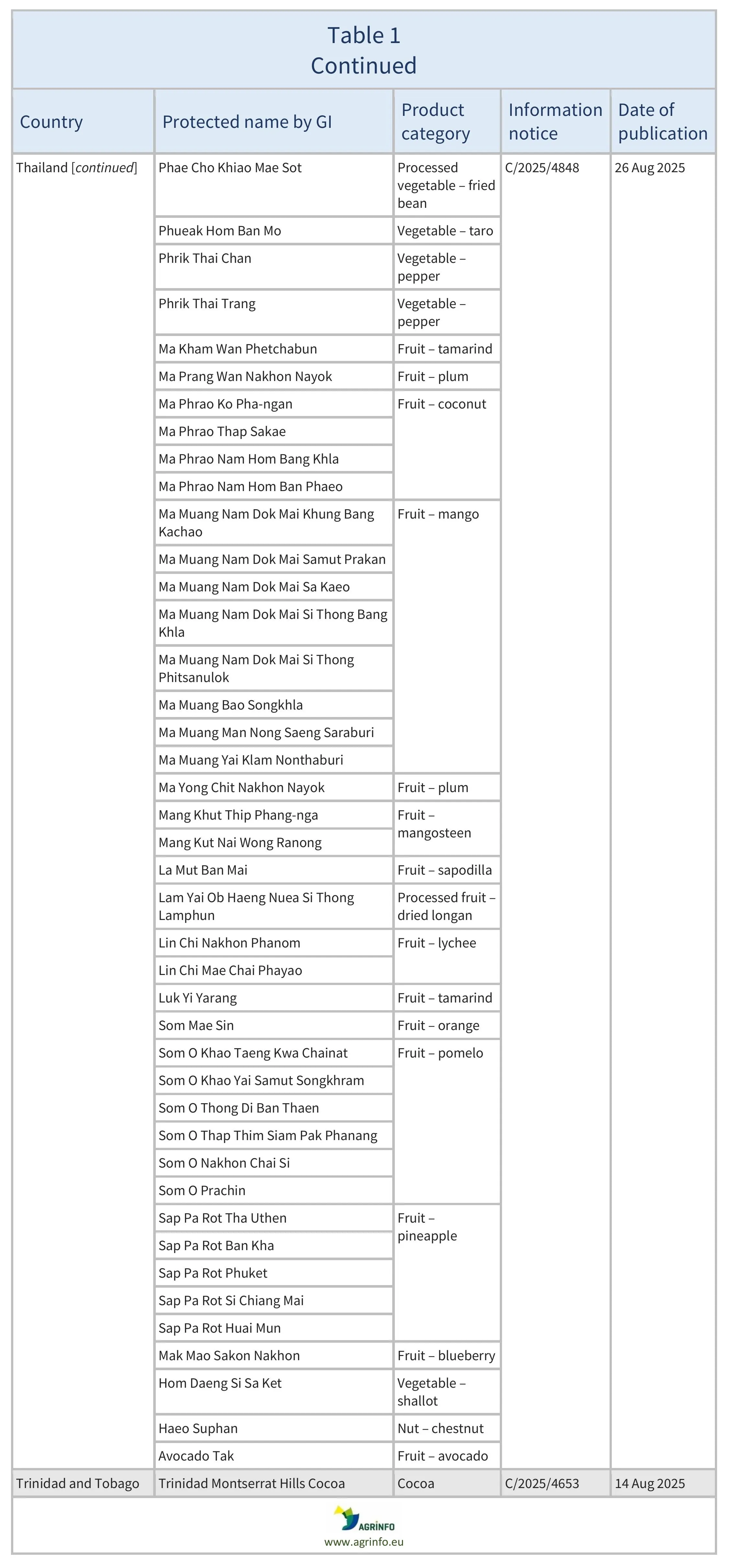Applications for geographical indications for non-EU products in 2025
- Common Agricultural Policy
- Geographical indications
- Labelling
Summary
This is a summary of the applications for registration as Protected Designation of Origin (PDO), Protected Geographical Indication (PGI), and traditional speciality guaranteed to the register of the European Union (EU) (eAmbrosia) for non-EU products from AGRINFO partner countries. It includes PGIs proposed by non-EU countries for EU recognition in the context of trade negotiations; and applications to the International Register of Appellations of Origin and Geographical Indications (Lisbon System).
This overview complements the summary of PDO, PGI, and (international) Appellations of Origin and Geographical Indications that have been successfully registered in 2025 (see Approved geographical indications for non-EU products in 2025).
2025 applications to the EU register of PDOs and PGIs for non-EU products
Applications: C/2025/1382; C/2025/5623; C/2025/5912; C/2025/6327; C/2025/6354; C/2025/6436; C/2025/6665; C/2025/6780
Public consultations: C/2025/4541; C/2025/4653; C/2025/4682; C/2025/4848
Update
This is a summary of the applications for registration as Protected Designation of Origin (PDO), Protected Geographical Indication (PGI), and traditional speciality guaranteed to the register of the European Union (EU) (eAmbrosia) for non-EU products from AGRINFO partner countries. It includes PGIs proposed by non-EU countries for EU recognition in the context of trade negotiations; and applications to the International Register of Appellations of Origin and Geographical Indications (Lisbon System).
This overview complements the summary of PDO, PGI, and (international) Appellations of Origin and Geographical Indications that have been successfully registered in 2025 (see Approved geographical indications for non-EU products in 2025).
Impacted Products
Rose essential oil, prepared meat, edible vegetables, prepared cereals, coconut, coffee (ground and as beverage), fermented beverage, salt, clotted cream, sun-dried raisins from specific geographical areas
What is changing?
In 2025, the following applications for registration as PDOs and PGIs from non-EU countries were received and are being assessed. (For those already approved, see Approved geographical indications for non-EU products in 2025.)
Applications for registration as PDO
- “Isparta Gülyağı”, an essential oil obtained from the Isparta rose (Rosa damascena) grown in the province of Isparta, Türkiye (C/2025/1382)
- “Delice Doğal Kaynak Tuzu”, white natural salt of the Delice district of Kırıkkale province, Türkiye (C/2025/6436)
- “Afyon Kaymağı”, clotted cream made from milk of Anatolian buffalo raised in Afyonkarahisar province, Türkiye (C/2025/6665)
- “Manisa Sultani Çekirdeksiz Üzümü”, sun-dried raisins obtained from Sultani Çekirdeksiz grape (Vitis vinifera) grown in the Province of Manisa, Türkiye (C/2025/6780).
Applications for registration as PGI
- “Maphrao Namhom Ratchaburi”, a fresh green-skinned aromatic coconut from the Moo Si Khiao variety produced in Ratchaburi Province, Thailand (C/2025/5623)
- “Kilichi du Niger”, thinly sliced, dried, and spice-coated red meat from Niger’s farming regions (C/2025/6327)
- “Adana Şalgamı”, a fermented beverage from a mixture of black carrots and turnips from the city of Adana, Türkiye (C/2025/6354).
Application for product specification of a traditional speciality guaranteed
- “Türk Kahvesi” / “Turkish Coffee”, both ground coffee made by a traditional method of grounding and roasting, and a beverage from traditional brewing (C/2025/5912).
The following application for registration as PGI has been rejected, as the European Commission considers that it did not fulfil the requirements (Regulation 2025/26):
- “Erzurum Su Böreği”, a pastry from Türkiye for which an application was submitted in 2021 (Commission Implementing Decision 2025/1507).
PGIs under discussion in the context of trade negotiations
Discussions on geographical indications typically form part of bilateral trade negotiations between the EU and non-EU countries. During these negotiations, trading partners put forward geographical indications for which they seek protection in the EU. The proposed PGIs are made public and can be opposed by stakeholders in the EU or other non-EU countries.
In 2025, requests for geographical indications have been published in relation to the following AGRINFO partner countries: Costa Rica, Dominican Republic, Guyana, Jamaica, Philippines, Saint Lucia, Thailand, Trinidad and Tobago. The products under consideration are listed in Table 1.
Why?
Applications for PDOs and PGIs are made public so that concerned stakeholders whose economic interests may be unfairly damaged by the indications have the opportunity to present their substantiated concerns to the European Commission.
Timeline
Opposition to registration of the following applications may be lodged with the European Commission within 3 calendar months from the date indicated.
PDO applications
- “Delice Doğal Kaynak Tuzu”: from 28 November 2025
- “Afyon Kaymağı”: from 10 December 2025
- “Manisa Sultani Çekirdeksiz Üzümü”: from 23 December 2025.
PGI applications
- “Maphrao Namhom Ratchaburi”: from 17 October 2025
- “Kilichi du Niger”: from 19 November 2025
- “Adana Şalgamı”: from 21 November 2025.
Traditional speciality guaranteed application
- “Türk Kahvesi” / “Turkish Coffee”: from 5 November 2025.
Opposition to geographical indications proposed in the context of trade negotiations may be lodged with the European Commission within 2 calendar months from the publication date indicated in Table 1.
What are the major implications for exporting countries?
The potential benefits of geographical indications such as PGIs and PDOs are described in Geographical indications for agricultural products and foodstuffs explained.
Recommended Actions
Concerned stakeholders can present opposition to these proposals in the ways described below (date refers to time period following publication in the Official Journal of the European Union):
- for a proposed PDO and PGI, within 3 calendar months (via eAmbrosia)
- for an application to the Lisbon System, within 4 calendar months (via eAmbrosia)
- for a GI proposed in the context of trade negotiations, within 2 months (email AGRI-G3@ec.europa.eu); possible grounds for opposition are set out in the relevant information notice (see Table 1).
If no reasoned statement of opposition is received within the relevant time period against the registration of these names, they will be granted protection in the EU.
Background
Applications for registration of PDOs and PGIs received by the European Commission are published in the Official Journal of the European Union.
If no statement of opposition is received by the European Commission within 3 months, the PDO/PGI is registered as a geographical indication in the EU register (eAmbrosia) and granted protection in the EU (Regulations 2024/1143 and 2025/26).
For further information on the EU’s system for protecting geographical indications, see Geographical indications for agricultural products and foodstuffs explained.
Resources
European Commission. Geographical indications and quality schemes explained
Regulation 2019/1753 on the action of the Union following its accession to the Geneva Act of the Lisbon Agreement on Appellations of Origin and Geographical Indications
Regulation 2024/1143 on geographical indications for wine, spirit drinks and agricultural products, as well as traditional specialities guaranteed and optional quality terms for agricultural products
Regulation 2025/26 laying down rules for the application of Regulation 2024/1143 as regards registrations, amendments, cancellations, enforcement of the protection, labelling and communication in respect of geographical indications and traditional specialities guaranteed
Sources
Applications: C/2025/1382; C/2025/5623; C/2025/5912; C/2025/6327; C/2025/6354; C/2025/6436; C/2025/6665; C/2025/6780
Public consultations: C/2025/4541; C/2025/4653; C/2025/4682; C/2025/4848
Tables & Figures
Disclaimer: Under no circumstances shall COLEAD be liable for any loss, damage, liability or expense incurred or suffered that is claimed to have resulted from the use of information available on this website or any link to external sites. The use of the website is at the user’s sole risk and responsibility. This information platform was created and maintained with the financial support of the European Union. Its contents do not, however, reflect the views of the European Union.
2025 applications to the EU register of PDOs and PGIs for non-EU products
Applications: C/2025/1382; C/2025/5623; C/2025/5912; C/2025/6327; C/2025/6354; C/2025/6436; C/2025/6665; C/2025/6780
Public consultations: C/2025/4541; C/2025/4653; C/2025/4682; C/2025/4848
What is changing and why?
In 2025, the following applications for registration as Protected Designation of Origin (PDO), Protected Geographical Indication (PGI), and traditional speciality guaranteed from non-EU countries have been received and are being assessed. (For those already approved, see Approved geographical indications for non-EU products in 2025.)
Applications for registration as PDO
- “Isparta Gülyağı”, an essential oil obtained from the Isparta rose (Rosa damascena) grown in the province of Isparta, Türkiye (C/2025/1382)
- “Delice Doğal Kaynak Tuzu”, white natural salt of the Delice district of Kırıkkale province, Türkiye (C/2025/6436)
- “Afyon Kaymağı”, clotted cream made from milk of Anatolian buffalo raised in Afyonkarahisar province, Türkiye (C/2025/6665)
- “Manisa Sultani Çekirdeksiz Üzümü”, sun-dried raisins obtained from Sultani Çekirdeksiz grape (Vitis vinifera) grown in the Province of Manisa, Türkiye (C/2025/6780).
Applications for registration as PGI
- “Maphrao Namhom Ratchaburi”, a fresh green-skinned aromatic coconut from the Moo Si Khiao variety produced in Ratchaburi Province, Thailand (C/2025/5623)
- “Kilichi du Niger”, thinly sliced, dried, and spice-coated red meat from Niger’s farming regions (C/2025/6327)
- “Adana Şalgamı”, a fermented beverage from a mixture of black carrots and turnips from the city of Adana, Türkiye (C/2025/6354).
Application for product specification of a traditional speciality guaranteed
- “Türk Kahvesi” / “Turkish Coffee”, both ground coffee made by a traditional method of grounding and roasting, and a beverage from a traditional method of brewing (C/2025/7453).
The following application for registration as PGI has been rejected, as the European Commission considers that it did not fulfil the requirements:
- “Erzurum Su Böreği”, a pastry from Türkiye for which an application was submitted in 2021 (Commission Implementing Decision 2025/1507).
PGIs under discussion in the context of trade negotiations
Bilateral trade negotiations between the EU and non-EU countries include geographical indications for which the trade partners seek protection in the EU. The proposed PGIs are made public and can be opposed by stakeholders in the EU or other non-EU countries.
In 2025, requests for geographical indications were published in relation to the following AGRINFO partner countries: Costa Rica, Dominican Republic, Guyana, Jamaica, Philippines, Saint Lucia, Thailand, Trinidad and Tobago. The products under consideration are listed in Table 1.
Actions
Objections to a name being registered as a geographical indication in the EU register (eAmbrosia) or in the international register (Lisbon System) can be communicated to the European Commission within 3 and 4 months, respectively, from the date when the application is published in the Official Journal of the European Union.
Opposition to geographical indications proposed in the context of trade negotiations must be sent within 2 months to AGRI-G3@ec.europa.eu.
Timeline
Opposition to registration of the following applications may be lodged with the European Commission within 3 calendar months from the date indicated.
PDO applications
- “Delice Doğal Kaynak Tuzu”: from 28 November 2025
- “Afyon Kaymağı”: from 10 December 2025
- “Manisa Sultani Çekirdeksiz Üzümü”: from 23 December 2025.
PGI applications
- “Maphrao Namhom Ratchaburi”: from 17 October 2025
- “Kilichi du Niger”: from 19 November 2025
- “Adana Şalgamı”: from 21 November 2025.
Traditional speciality guaranteed application
- “Türk Kahvesi” / “Turkish Coffee”: from 5 November 2025.
Opposition to geographical indications proposed in the context of trade negotiations may be lodged with the European Commission within 2 calendar months from the publication date indicated in Table 1.
Tables & Figures
Disclaimer: Under no circumstances shall COLEAD be liable for any loss, damage, liability or expense incurred or suffered that is claimed to have resulted from the use of information available on this website or any link to external sites. The use of the website is at the user’s sole risk and responsibility. This information platform was created and maintained with the financial support of the European Union. Its contents do not, however, reflect the views of the European Union.



